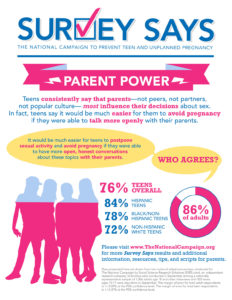
The month of October was national “Let’s Talk” month. The point behind the designation is to talk to kids about that three-letter word so many parents dread: sex.
The subject of sex isn’t something we often want to learn about all on their own; we aren’t learning to play the guitar after all. According to The National Campaign to Prevent Teen and Unplanned Pregnancy, “teens consistently say that parents–not peers, not partners, and not pop culture–MOST influence their decisions about sex. In fact, teens say it would be much easier for them to avoid pregnancy if they were able to talk more openly with their parents about these topics.”

There are some misconceptions about the barriers that block talking about sex with kids. According to a 2014 survey conducted by Planned Parenthood, parents and children agree that these are not the problems encountered when trying to talk about sex:
• Children being too young
• Worry about embarrassment
• Preferring to rely on sex education in schools
• Not having enough information
• Believing the other parent should take care of conversations
In a press release published in early October, the Minnesota Department of Health (MDH) points out that studies done by Advocates for Youth show those children who take part in open conversations about healthy sexual relationships start having sex later, and engage in sexually risky behavior less often than their peers. Having an adult teens can talk to and who cares about them also makes them less likely to have sex during high school, per the Minnesota Study Survey.
The MDH recommends that parents not wait until the teenage years to start talking about sex. Age-appropriate conversations about relationships and sex should take place early in a child’s life. This, according to studies, will help curb the 1 in 4 teens who contract a sexually transmitted disease or infection every year. The most common of these diseases is the human papillomavirus (HPV), perhaps better known as genital warts. There is currently a vaccine for 11 and 12-year-olds that can prevent HPV, as well as the numerous cancers that are often the result of different HPV types (News Release).

There are two rules to keep in mind when having this conversation. The first is simple: Don’t freak out. If a question is asked about sex, that doesn’t mean your child is already sexually active. Just remember that every one of these conversations helps build trust between you and your child so that when they have these questions about sex, love, and relationships they will come to you first.
The second rule is also simple: Respect your child. They are complicated human beings going through complicated times in their lives. Feelings can be scary. When your child asks a question about a relationship they are in, or want to be in, or is on their mind, it’s best not to dismiss it as a nothing more than a crush or teen love. Sit down with them and talk about it.
For more tips and information on how best to approach this subject, the Parent Portal at the National Campaign to Prevent Teen and Unplanned Pregnancy is a great resource.
Below are some links to a few others:
- The When, The How, and the Why: Talking to Your Teens About Sex, Love, and Relationships [VIDEO]
- More than Just the Talk: Talking to Your Teens About Sex, Love, and Relationships [VIDEO]
- 10 Tips for Parents to Help their Children Avoid Teen Pregnancy
- Relationship Redux: Tips and Scripts for Talking to Your Kids About Relationships
- Survey Says: TV Guide
- Survey Say: My Inner Seflie
- Survey Says: Madre and Padre Power
- 5 Tips for Navigating TV, Social Media, and Sex With Your Teens
- Do’s and Don’ts: Parents, Teens, and the Talk
















